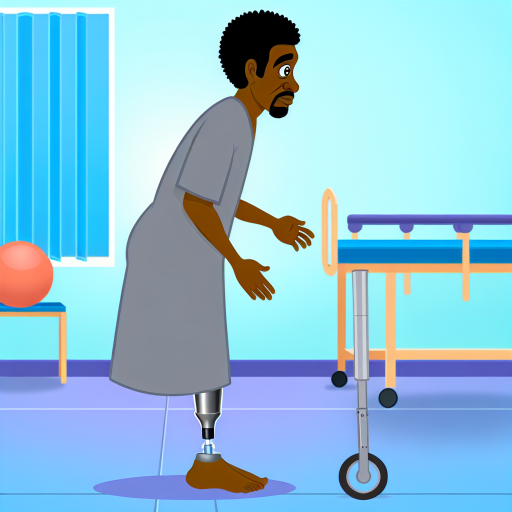Introduction:
Biomedical technology in Nigeria involves advanced medical equipment and techniques used in healthcare settings.
The importance of biomedical technology lies in its role in improving healthcare outcomes and patient care.
When it comes to the impact of biomedical technology in Nigeria on healthcare delivery, the changes are significant and far-reaching.
Let’s explore how this technology has transformed the healthcare landscape in the country.
Improved Diagnosis and Treatment of Diseases
- Biomedical technology has led to more accurate and efficient diagnosis of various diseases.
- Advanced imaging techniques allow for earlier detection of conditions such as cancer and heart disease.
- Targeted therapies based on genetic testing have revolutionized treatment options for patients.
- Better understanding of diseases at the molecular level has paved the way for personalized medicine.
Increase in Access to Healthcare Services
- Telemedicine and mobile health apps have made healthcare more accessible to remote communities.
- Patients can consult with specialists from anywhere in the country without having to travel long distances.
- Virtual clinics and online pharmacies have enabled people to receive medical advice and medications conveniently.
- Biomedical technology has bridged the gap in healthcare delivery between urban and rural areas.
Reduction in Mortality Rates
- Early detection of diseases through screening programs has led to higher survival rates.
- Improved surgical techniques and medical devices have enhanced the success of critical procedures.
- Real-time monitoring of patients through wearable devices has prevented life-threatening complications.
- Integration of electronic health records has enabled healthcare providers to coordinate care more effectively.
The community impact of biomedical technology in Nigeria cannot be overstated.
From improved diagnosis and treatment of diseases to increased access to healthcare services and reduced mortality rates, the benefits are clear.
As technology continues to advance, we can expect even greater advancements in the field of healthcare delivery in the future.
Economic Impact:
Biomedical technology has led to the creation of new job opportunities in the healthcare sector.
As the demand for specialized healthcare services increases, there is a need for skilled professionals to operate and maintain the advanced technology.
This has opened up a new avenue for employment for many individuals, thereby reducing unemployment rates in the country.
The availability of state-of-the-art biomedical technology in Nigeria has attracted patients from other countries to seek medical treatment in the country.
This has led to a boost in medical tourism, bringing in foreign exchange and boosting the economy.
Patients from neighboring countries now prefer to travel to Nigeria for advanced medical procedures, contributing to the growth of the healthcare sector.
The development of biomedical technology has encouraged local innovation and research in Nigeria.
With access to advanced medical equipment and technology, local researchers and innovators have been able to explore new avenues in healthcare.
This has led to the development of new medical breakthroughs and advancements, putting Nigeria on the map as a hub for healthcare innovation in Africa.
Learn More: Understanding Blood Disorders Common in Nigeria
Education and Training:
Development of skilled healthcare professionals.
Training programs and workshops on biomedical technology.
Collaboration with universities and research institutions.
Development of Skilled Healthcare Professionals
Biomedical technology in Nigeria has had a significant impact on the education and training of healthcare professionals.
With the advancement of medical equipment and technology, there is a growing need for skilled professionals who can effectively utilize these tools to provide quality healthcare services to the community.
Training Programs and Workshops on Biomedical Technology
To meet the demand for skilled professionals, training programs and workshops on biomedical technology have been developed.
These programs aim to equip healthcare workers with the knowledge and skills necessary to operate and maintain complex medical equipment effectively.
By providing hands-on training, professionals can enhance their understanding of how to use the latest technology to improve patient care.
Collaboration with Universities and Research Institutions
Furthermore, the collaboration between biomedical technology companies and universities/research institutions has been instrumental in advancing the field of biomedical technology in Nigeria.
This partnership has allowed for the exchange of knowledge and expertise, leading to the development of innovative technologies and solutions that benefit both healthcare professionals and patients.
Education and training play a crucial role in the community impact of biomedical technology in Nigeria.
By developing skilled healthcare professionals, providing training programs on biomedical technology, and collaborating with universities and research institutions, the healthcare sector in Nigeria can continue to progress and improve the quality of care delivered to the community.
Find Out More: Overview of Veterinary Regulations in Nigeria
Challenges:
Biomedical technology plays a crucial role in improving healthcare in Nigeria.
However, the community impact of this technology is hindered by various challenges.
Lack of Funding for Research and Development
One of the primary challenges facing biomedical technology in Nigeria is the lack of adequate funding for research and development.
This hampers the ability of researchers and scientists to innovate and create new solutions to address the healthcare needs of the community.
Limited Access to Advanced Equipment and Technology
Another significant challenge is the limited access to advanced equipment and technology.
Many healthcare facilities in Nigeria lack the necessary tools and resources to effectively implement and utilize biomedical technology.
This restricts the potential impact on the community.
Inadequate Regulatory Framework
The inadequate regulatory framework in Nigeria poses a challenge to the effective implementation of biomedical technology.
Without proper regulations and oversight, there is a risk of substandard practices and products.
This can undermine the trust and adoption of these technologies within the community.
Transform Your Career with Expert Guidance
Get personalized mentorship consulting that’s tailored to your unique path. Our expert advice is actionable and exclusive.
Get StartedAddressing these challenges is essential to maximizing the community impact of biomedical technology in Nigeria.
By overcoming funding constraints, improving access to advanced equipment, and strengthening regulatory frameworks, the healthcare sector can harness the full potential of technology.
This can help improve outcomes and quality of life for the population.
Delve into the Subject: Innovative Mental Health Programs in Nigeria

Ethical Considerations:
- Proper ethical guidelines for research and experimentation
- Importance of informed consent
- Protection of patients’ privacy and confidentiality
When it comes to biomedical technology in Nigeria, ethical considerations play a crucial role in ensuring that the community benefits while maintaining the highest standards of morality and integrity.
Proper Ethical Guidelines for Research and Experimentation
Researchers and scientists involved in biomedical technology in Nigeria must adhere to strict ethical guidelines when conducting research and experimentation. This includes obtaining proper approval from ethical review boards, following established protocols, and ensuring the safety and well-being of research subjects.
Any deviation from ethical guidelines can have serious consequences, not only for the individuals involved in the research but also for the reputation of the entire biomedical community in Nigeria. It is essential to prioritize ethical considerations to uphold the integrity of the field.
Importance of Informed Consent
Informed consent is a fundamental ethical principle that must be upheld in all biomedical research and experimentation. In Nigeria, researchers must ensure that participants fully understand the risks and benefits of their involvement in studies before providing consent.
Obtaining informed consent involves providing clear and comprehensive information to participants about the nature of the research, potential risks, and their rights as research subjects. Without informed consent, research cannot proceed ethically, as it violates the autonomy and rights of individuals.
Protection of Patients’ Privacy and Confidentiality
Protecting the privacy and confidentiality of patients is another critical ethical consideration in the realm of biomedical technology in Nigeria. Patients have the right to have their personal information safeguarded and kept confidential during all stages of research and treatment.
Healthcare providers and researchers must take steps to ensure that patient data is stored securely, shared only with authorized individuals, and anonymized whenever possible to protect the identities of patients. Breaches of confidentiality can have far-reaching consequences and erode trust within the community.
Ethical considerations are paramount in ensuring the responsible and beneficial use of biomedical technology in Nigeria. By upholding proper ethical guidelines, obtaining informed consent, and protecting patients’ privacy, the biomedical community can make a positive impact while maintaining the highest standards of integrity and morality.
Learn More: Case Studies of Preventive Medicine Success in Nigeria
Community Engagement:
Public awareness campaigns are vital for educating people on the benefits of biomedical technology.
Involving local communities in healthcare projects helps to ensure inclusivity and relevance.
Community-based healthcare programs foster a sense of ownership and empowerment among community members.
- Public awareness campaigns are vital for educating people on the benefits of biomedical technology.
- Involving local communities in healthcare projects helps to ensure inclusivity and relevance.
- Community-based healthcare programs foster a sense of ownership and empowerment among community members.
Impact of Biomedical Technology on Healthcare in Nigeria
Reflecting on the impact of biomedical technology in Nigeria, it is evident that advancements have greatly improved healthcare delivery.
From diagnostic tools to treatment options, technology has revolutionized the healthcare sector.
There is a pressing need for increased investment and support for further research and development in biomedical technology.
This investment will enhance the quality of healthcare services in Nigeria.
Additionally, it will stimulate economic growth and job creation.
The future prospects for healthcare improvement through technology advancements are promising.
With continued innovation and investment, Nigeria can strive towards achieving universal healthcare coverage.
It will also help in combating prevalent diseases in the country.
Additional Resources
Faculty Profile – Jacobs School of Medicine and Biomedical …
August 2022 – BME Blaze: Bunmi Fariyike | Biomedical Engineering




